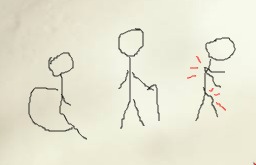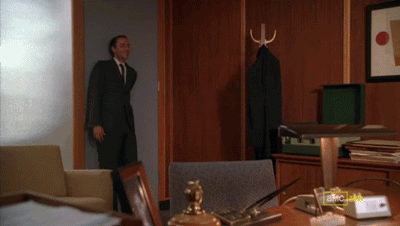I think having compassion or trying to understand someone's point of view is a luxury. Well, luxury is the wrong word but I mean it should never be your first priority in a conflict. Other things are more important, and compassion/seeing other people's point of view should only be attempted if other things are there first.
Lia left this comment on my pop culture blog where I had reviewed a glurgey YA novel about bullying:
"i can say this as someone who often tries to cope with things by being sort of detached but also outwardly optimistic and upbeat even if i'm not really feeling that way, it's not actually desirable or emotionally healthy to react to everything that way. a person who acts like that in response to bullying in real life is still going to be affected by the bullying, but they're more likely to turn their feelings about it inward on themselves. instead of (rightly) getting angry at the bullies, they might get angry at themselves for being bullied, for being unable to stop the bullying, and for being angry/upset about anything in the first place. sometimes these are people who have been taught, or have decided, that it's morally wrong to feel or express negative emotions. sometimes these are people who can react really calmly to being mistreated because they are very used to it and honestly believe that they deserve it or that it's normal. and that's less inspiring than it is depressing."
Lia is pretty stellar.
My mom has been visiting me and tonight we were having dinner with the family I work for. We got on the subject of different illnesses and injuries I had when I was a kid and how usually people did not realize what was going on because I didn't have the level of distress they were expecting.
Not having enough visible distress is something I really hate about my life, to the extent that I've always assumed it was some kind of trauma reaction. There's not really a ton of evidence for this so it might just be that I'm projecting/imagining that because it has been such a bad experience for me. It's obviously been going on since I was really little so the list of possible traumas is pretty narrow and it's nothing obvious. Also, it is a common problem for people with autism so it's either that it results from a traumatic experience that a lot of us have, or it just is part of autism.
In addition to less visible distress I also have more trouble noticing and identifying my feelings than other people do. To make things even more annoying, I sometimes develop obsessive fears about having certain feelings and because my feelings aren't very concrete to me in the first place it can be really easy for me to get convinced that I'm really feeling those things just because I'm worrying about feeling them.
I really confused someone recently by talking about how far I'll go to avoid situations where someone downplays my disability or refuses me services. I basically have chosen not to ever pursue any kind of services because if I was not able to get them, I would get too upset, and to me that's more important than a chance to get help I need.
I guess it doesn't make that much sense to other people why it affects me so much if someone doesn't think I have a significant disability*, even if the person isn't a close friend or someone who has a lot of power over me. The reason it affects me is that I don't feel secure/distinct about my disability but it's very important for me to know that I'm disabled in order to manage and cope with my life. I surround myself with people who either support this, or don't talk about it. If someone says that I don't have a significant disability then that idea is introduced to my brain and even if I know the person isn't that smart or doesn't know me that well, it introduces a lot of doubt and I start seeing myself as a liar and a faker and can become suicidal or otherwise be affected in my day to day life.
*(I know some people use the term "significant disability" to mean a "profound" disability like my boss has, but I'm literally using it to mean a disability that is significant, i.e. it affects my daily life in a lot of major ways even though I can work, talk, etc.)
If someone says I'm not disabled or says something else that demonstrably isn't true, but would be threatening to my quality of life if I believed it (for example, saying that the family I work for hates me), I immediately want to remove myself from that person and see them as an enemy. I don't want to engage with the person about this or even think to myself about why they think what they do or why they said it to me. If I think about it too much, I will definitely start believing it so I just have to be brief and rational--it's not true, they were wrong, it's a harmful idea, and I'm rejecting it and the person who introduced it.
By the way this can be pretty unfair because someone who is perfectly nice might just make some uninformed statements about my disability or something else, and they might even see their mistake if I just talked to them about it, but I can't talk to them because I can't risk being convinced by them. If I did talk to them, it would be very brusque to just give them the information about why they're wrong in case they want to think about it, and then end the conversation. I probably wouldn't do this with most people, because it obviously seems mean and hurtful, but it's the only way that I would be able to engage without potentially hurting myself.
I'm going a bit off track here--the original thing I was thinking about was being secure in knowing when someone has hurt you, and being secure in the idea that it's wrong for someone to hurt you. Some people are secure in this and some aren't including me. In my opinion, if you are like this and immediately attempt compassion (or you encourage someone like this to immediately attempt compassion), what is really happening is that the person could hurt themselves.
For example, let's say Emma and Shirley work together. Emma is very brusque with Shirley, makes fun of the way she walks, talks, and looks, never thanks her for anything she does, and is patronizing. Shirley is hurt by the way Emma acts and finds it to be insulting. She doesn't like Emma because of it. Shirley decides to try to see the good in Emma and treat her well even though she doesn't like her.
On the other hand, let's say Shirley never gets to the point of being insulted and not liking Emma, even though Emma is treating her disrespectfully. Trying to be compassionate, Shirley always makes excuses for Emma or tries to think of reasons that she has done something wrong to provoke Emma or reasons that she is wrong to be upset by the way Emma acts. When Shirley has negative feelings toward Emma she tries hard to make herself feel the opposite and see Emma in the most complimentary light. Shirley works so hard to be nice to Emma that she comes off like she particularly likes her, even though Emma is extremely rude. I have been in this situation a few times and I think it damages me when instead of focusing on seeing that someone is treating me badly, I focus on seeing the good in them.
I have to assume that most people (or at least people who have tried to encourage me to be more compassionate/educational/thinking about other people's feelings) take it for granted that they will see it as wrong for someone to hurt them and that nothing can change that. Then when they talk about compassion, maybe it's like they're skipping the foundation that should be in place; they always have it so they barely notice it and don't mention it. But to me, because the foundation isn't there, they're advocating something quite different.
Without the foundation, loving your enemies is just hating yourself.
Lia is pretty stellar.
My mom has been visiting me and tonight we were having dinner with the family I work for. We got on the subject of different illnesses and injuries I had when I was a kid and how usually people did not realize what was going on because I didn't have the level of distress they were expecting.
Not having enough visible distress is something I really hate about my life, to the extent that I've always assumed it was some kind of trauma reaction. There's not really a ton of evidence for this so it might just be that I'm projecting/imagining that because it has been such a bad experience for me. It's obviously been going on since I was really little so the list of possible traumas is pretty narrow and it's nothing obvious. Also, it is a common problem for people with autism so it's either that it results from a traumatic experience that a lot of us have, or it just is part of autism.
In addition to less visible distress I also have more trouble noticing and identifying my feelings than other people do. To make things even more annoying, I sometimes develop obsessive fears about having certain feelings and because my feelings aren't very concrete to me in the first place it can be really easy for me to get convinced that I'm really feeling those things just because I'm worrying about feeling them.
I really confused someone recently by talking about how far I'll go to avoid situations where someone downplays my disability or refuses me services. I basically have chosen not to ever pursue any kind of services because if I was not able to get them, I would get too upset, and to me that's more important than a chance to get help I need.
I guess it doesn't make that much sense to other people why it affects me so much if someone doesn't think I have a significant disability*, even if the person isn't a close friend or someone who has a lot of power over me. The reason it affects me is that I don't feel secure/distinct about my disability but it's very important for me to know that I'm disabled in order to manage and cope with my life. I surround myself with people who either support this, or don't talk about it. If someone says that I don't have a significant disability then that idea is introduced to my brain and even if I know the person isn't that smart or doesn't know me that well, it introduces a lot of doubt and I start seeing myself as a liar and a faker and can become suicidal or otherwise be affected in my day to day life.
*(I know some people use the term "significant disability" to mean a "profound" disability like my boss has, but I'm literally using it to mean a disability that is significant, i.e. it affects my daily life in a lot of major ways even though I can work, talk, etc.)
If someone says I'm not disabled or says something else that demonstrably isn't true, but would be threatening to my quality of life if I believed it (for example, saying that the family I work for hates me), I immediately want to remove myself from that person and see them as an enemy. I don't want to engage with the person about this or even think to myself about why they think what they do or why they said it to me. If I think about it too much, I will definitely start believing it so I just have to be brief and rational--it's not true, they were wrong, it's a harmful idea, and I'm rejecting it and the person who introduced it.
By the way this can be pretty unfair because someone who is perfectly nice might just make some uninformed statements about my disability or something else, and they might even see their mistake if I just talked to them about it, but I can't talk to them because I can't risk being convinced by them. If I did talk to them, it would be very brusque to just give them the information about why they're wrong in case they want to think about it, and then end the conversation. I probably wouldn't do this with most people, because it obviously seems mean and hurtful, but it's the only way that I would be able to engage without potentially hurting myself.
I'm going a bit off track here--the original thing I was thinking about was being secure in knowing when someone has hurt you, and being secure in the idea that it's wrong for someone to hurt you. Some people are secure in this and some aren't including me. In my opinion, if you are like this and immediately attempt compassion (or you encourage someone like this to immediately attempt compassion), what is really happening is that the person could hurt themselves.
For example, let's say Emma and Shirley work together. Emma is very brusque with Shirley, makes fun of the way she walks, talks, and looks, never thanks her for anything she does, and is patronizing. Shirley is hurt by the way Emma acts and finds it to be insulting. She doesn't like Emma because of it. Shirley decides to try to see the good in Emma and treat her well even though she doesn't like her.
On the other hand, let's say Shirley never gets to the point of being insulted and not liking Emma, even though Emma is treating her disrespectfully. Trying to be compassionate, Shirley always makes excuses for Emma or tries to think of reasons that she has done something wrong to provoke Emma or reasons that she is wrong to be upset by the way Emma acts. When Shirley has negative feelings toward Emma she tries hard to make herself feel the opposite and see Emma in the most complimentary light. Shirley works so hard to be nice to Emma that she comes off like she particularly likes her, even though Emma is extremely rude. I have been in this situation a few times and I think it damages me when instead of focusing on seeing that someone is treating me badly, I focus on seeing the good in them.
I have to assume that most people (or at least people who have tried to encourage me to be more compassionate/educational/thinking about other people's feelings) take it for granted that they will see it as wrong for someone to hurt them and that nothing can change that. Then when they talk about compassion, maybe it's like they're skipping the foundation that should be in place; they always have it so they barely notice it and don't mention it. But to me, because the foundation isn't there, they're advocating something quite different.
Without the foundation, loving your enemies is just hating yourself.

 (1)
(1)

 , or a headcrip (thanks Samantha). Also sometimes a bad brains, but let's stick to what I'm saying in a better mood. Or let's stick to what I say when I'm trying to be objective, which is: autism. ASD.
, or a headcrip (thanks Samantha). Also sometimes a bad brains, but let's stick to what I'm saying in a better mood. Or let's stick to what I say when I'm trying to be objective, which is: autism. ASD.
